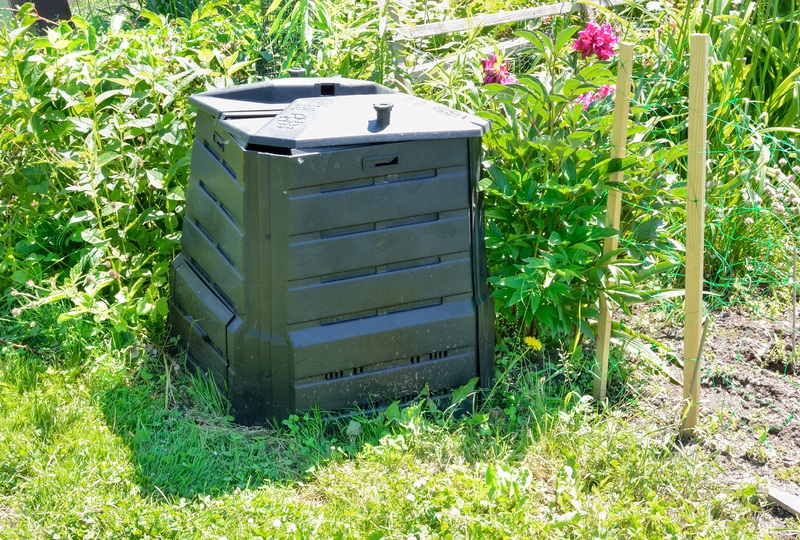Elevating Office Sustainability with Better Recycling
Posted on 23/06/2025
In the modern era, the need for businesses to focus on office sustainability has never been more pressing. As corporations and employees strive to lower their carbon footprints, one pivotal aspect stands out: better recycling in the workplace. By implementing robust recycling initiatives, offices can significantly reduce environmental impacts, promote eco-conscious behaviors, and improve their overall corporate image. In this comprehensive guide, we explore how to elevate office sustainability by enhancing recycling programs, reducing waste, and nurturing a culture of environmental responsibility.
Understanding Office Sustainability
Office sustainability extends beyond simple environmental compliance. It's about integrating eco-friendly practices into every aspect of workplace operations, from resource management to building design, and--crucially--waste disposal. Effective recycling solutions form a cornerstone of this approach, turning what might previously have been considered trash into valuable resources.
Why Sustainable Offices Matter
- Environmental impact: Offices are significant consumers of paper, plastic, and electronics, generating substantial waste. Reducing this waste through recycling is central to sustainability.
- Employee satisfaction: Workers are more satisfied and engaged when they know their employers care about the environment.
- Cost savings: Recycling can help lower waste disposal costs and even create potential revenue streams through material recovery.
- Corporate image: Sustainable practices bolster brand reputation and support corporate social responsibility initiatives.

Assessing Current Recycling Practices
To elevate your office's sustainability through better recycling, start by evaluating your existing waste management practices. This involves careful analysis of what is being discarded, how much is being recycled or composted, and what could be improved.
Conducting a Waste Audit
- Sort and measure: Have a team collect and audit trash and recycling for a week. Record types and quantities of recyclables and landfill-bound waste.
- Identify gaps: Look for recyclable materials--such as paper, plastics, or electronics--ending up in the wrong bins.
- Engage employees: Survey staff to understand their recycling habits and gather suggestions.
The findings from a waste audit will serve as the baseline for developing a more effective office recycling program.
Designing a Comprehensive Office Recycling Program
Once you have assessed the needs and opportunities for improvement, it's time to design and implement a tailored recycling program. A successful strategy for boosting recycling at work includes the following essential components.
1. Choose the Right Recycling Bins
- Clear labeling: Use universally recognized symbols, color codes, and examples of materials accepted in each bin.
- Strategic placement: Place clearly marked bins in high-traffic areas, near printers, cafeterias, and meeting rooms.
- Bin variety: Provide bins for common items like paper, plastics, metal, glass, and e-waste.
2. Educate and Engage Employees
- Host recycling workshops: Conduct regular training sessions to clarify what can be recycled, composted, or reused.
- Create accessible resources: Develop simple guides and infographics. Make them available digitally and physically.
- Communicate transparently: Share progress, successes, and challenges with staff regularly.
3. Establish Green Teams
Forming an enthusiastic team responsible for environmental initiatives can be a game-changer. These "Green Teams" foster leadership, spark creative solutions, and drive participation for sustainable office improvements.
4. Set Measurable Goals and Monitor Progress
- Track recycling rates: Use weights, volume, or estimates to report monthly numbers.
- Set ambitious but achievable targets: For example, increase recycling rates by 30% within a year.
- Celebrating milestones: Recognize teams and individuals for their contributions to sustainability goals.
Beyond the Basics: Expanding Office Recycling
A truly sustainable office doesn't stop at recycling paper and bottles. Modern offices generate a wide array of recyclable materials. Here are advanced recycling solutions that further elevate workplace sustainability:
Organic Waste and Composting
- Food scraps: Collect kitchen and cafeteria waste for local composting or municipal pickup.
- Compost bins: Place these near coffee stations, kitchens, and lunchrooms.
- Educational campaigns: Inform staff on what can and cannot be composted.
Responsible E-Waste Disposal
With frequent technology upgrades, offices accumulate large amounts of electronic waste (e-waste). Properly managing devices like computers, printers, and batteries is essential for both data privacy and environmental protection.
- Certified recyclers: Partner exclusively with e-waste recyclers who are certified for safe and eco-friendly disposal.
- Collection events: Organize regular e-waste drop-off days for staff to safely dispose of electronics.
Office Supplies and Stationery
- Pens and markers: Participate in take-back programs with brands that recycle writing instruments.
- Ink and toner cartridges: Use manufacturer or third-party cartridge return and recycling schemes.
- Binders, folders, and more: Donate reusable items to schools or charities.
Reducing Office Waste Generation
While boosting recycling rates is crucial, the most sustainable approach is to reduce waste at the source. This involves making conscious purchasing decisions and rethinking resource use throughout the workplace.
Sustainable Procurement Policies
- Choose recycled materials: Purchase office paper, stationery, and furniture made from post-consumer recycled content.
- Eco-friendly suppliers: Support vendors who prioritize sustainability in their products and packaging.
- Bulk buying: Reduce packaging waste and costs by ordering supplies in bulk.
Digital Transformation
- Paperless workflows: Transition to cloud-based systems, digital signatures, and electronic communication.
- Online collaboration: Use project management tools and shared digital documents to minimize physical copies.
Reuse and Repair Initiatives
- Reusable office supplies: Encourage the use of refillable pens, mugs, and water bottles.
- Repair programs: Train staff to fix minor equipment or furniture issues before opting for replacement.
- Donation drives: Donate surplus or gently used office supplies to nonprofits.
Building a Culture of Sustainability
Long-lasting improvements in office sustainability require a supportive culture that celebrates environmental responsibility. Leaders play a critical role in modeling green behaviors, setting expectations, and incentivizing participation.
Leadership and Policy Support
- Executive buy-in: Make sustainability a leadership priority, discussed in meetings and reflected in company values.
- Clear policies: Develop written sustainability policies covering recycling, purchasing, and energy use.
- Regular reviews: Update policies and goals in response to progress, feedback, and new opportunities.
Employee Engagement and Recognition
- Sustainability challenges: Organize competitions to see which team can recycle the most or reduce waste the fastest.
- Eco-champions: Recognize staff who exhibit outstanding commitment to green initiatives with awards or incentives.
- Open feedback: Encourage suggestions for further improvements and reward innovative ideas.
The Benefits of Better Recycling in the Office
When offices embrace holistic recycling practices as part of their sustainability journey, the benefits are multifold:
- Reduced landfill contributions: More materials are diverted from landfills, conserving space and decreasing pollution.
- Resource conservation: Recycling conserves raw materials, energy, and water--vital for long-term sustainability.
- Stronger employee relationships: Teams unite around shared environmental goals, boosting morale and collaboration.
- Market advantage: Sustainable brands attract clients, investors, and top talent who value corporate responsibility.
Case Study: Transforming a Typical Office Through Recycling
To illustrate the impact of better workplace recycling, consider a fictional mid-sized company, "EcoForward Ltd." Prior to their recycling overhaul, EcoForward's office generated 5 tons of waste annually, with only a 10% recycling rate. After launching a structured recycling program with comprehensive staff training and new recycling stations, the company achieved a 60% recycling rate within 8 months.
Key changes included the introduction of recycling bins at every workstation, hosting an e-waste collection drive, and negotiating supply contracts for recycled-content paper. Employees were encouraged to use mugs and water bottles. As a result, the company reduced landfill waste by 3 tons annually, saved thousands on waste collection fees, and was recognized with a local Green Workplace Award.
Overcoming Challenges in Office Recycling Programs
Despite the best intentions, many organizations face barriers to effective recycling in the workplace. These can include confusion over what is recyclable, lack of employee engagement, or logistical issues. Here's how to confront these challenges:
- Clear communication: Use multi-language signage, visual aids, and regular reminders.
- Ease of access: Ensure recycling bins are as convenient to use as trash cans.
- Ongoing education: Periodically update employees on recycling best practices and local regulations.
- Continuous improvement: Periodically revisit the recycling plan and make iterative enhancements.

Innovations and the Future of Office Recycling
As technology and sustainability practices evolve, so too do opportunities for more effective office recycling. Companies are exploring:
- Smart bins: Waste bins equipped with sensors that track fill levels and minimize contamination by only unlocking for the correct material.
- Zero-waste offices: Pursuing ambitious goals to send no waste to landfill or incineration.
- Circular procurement: Favoring office supplies designed for reuse, repair, or easy recycling at end-of-life.
- Environmental partnerships: Collaborating with other companies or community groups to expand recycling infrastructure.
By investing in these leading-edge practices, today's offices will set a new standard for workplace sustainability for years to come.
Conclusion: Take Action to Elevate Sustainability at Work
Elevating office sustainability with better recycling is not only possible--it's necessary. Whether you are just beginning or aiming to fine-tune a mature program, every step toward smarter recycling in the workplace matters. From fostering a recycling-friendly culture to adopting cutting-edge waste management solutions, each initiative helps protect the planet, support employees, and strengthen your business.
Start your journey now: audit your office's waste, educate your team, and make recycling a pillar of your sustainable office strategy. Together, businesses can make a profound impact on our environment and inspire a more responsible future.

 020 3859 5574
020 3859 5574 020 3859 5574
020 3859 5574




 House clearance
House clearance Rubbish collection
Rubbish collection Do you have a waste build-up in your home that you need taken care of or cleared out? We provide top quality home clearance services in the...
Do you have a waste build-up in your home that you need taken care of or cleared out? We provide top quality home clearance services in the... At Junk Removals Services we believe strongly in providing all of our customers with good quality rubbish collection services in London. We understand the...
At Junk Removals Services we believe strongly in providing all of our customers with good quality rubbish collection services in London. We understand the...





